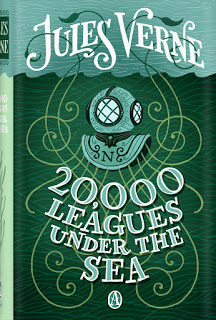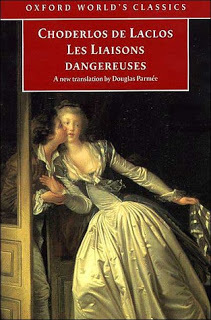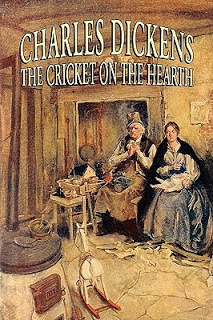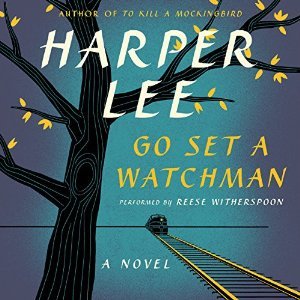Phil Villarreal's Blog, page 136
February 5, 2017
Book Report: 20,000 Leagues Under the Sea

Jules Verne was the Michael Crichton of his time, writing well-reasoned and plausible near-future sci-fi stories that turned out to be prophetic. He is out to dazzle his readers with his knowledge and speculation of the mysteries of the deep, and makes the dry lecture material more palatable by wrapping it in a vivid, stirring story of adventurers taken as half-willing captives by a domineering genius. There's a parallel to Vernes himself as Captain Nemo, captivating readers on a journey they must accept on his megalomaniacal terms. Throughout the globe-circling adventures, Nemo's prisoners plot their escape, but their efforts are halfhearted because they can't fully commit to stop wanting to see what happens next if they stay aboard the submarine. Nemo is every author, and M. Arronax, Ned Land and Conseil are the warring factions of a reader's psyche, battling distraction and disagreement with the inevitable course governed by one person alone. To read is to give up your agency in return for knowledge and experience you'd never otherwise be able to find on your own. That's the punishing gift Vernes doles out.
Published on February 05, 2017 07:44
January 24, 2017
Book Report: The Corrections

I read Freedom first, which spoiled me for this one. Franzen got better with time, developing his voice and narrative strength in the off years in between Great American Novels. By comparison, this one comes off as a grad school literary exercise, with Franzen finding laborious ways to insert the word "correction" in as many different tenses as possible every 5 pages or so.
But despite the formula, or maybe even because of it, Franzen squeezes out astounding insights into middle-age angst and the humiliating death march into old age. His most powerful passages pry open the mind of its saddest character, the family patriarch who tangles with dementia, losing more of himself in each bout with hallucinatory angst.
Franzen's penchant for giving overly cute names to law firms, corporations and pharmaceutical wonderdrugs is as distracting as his use of the title, but the trying-too-hard cuteness doesn't detract much from the heart of his meandering story of mismatched, dysfunctional siblings who orbit their rotting nuclear parental centers. The Corrections is a book about spectacularly creative failures that ambitions seek and find in life's dark corridors, and as depressing as it is, its ability to illuminate the grim shared experiences that await us all manages to grant the novel a slice of encouragement of the human spirit it mocks, twists, steps on and ... yes ... corrects.
Published on January 24, 2017 20:29
January 10, 2017
BBC Interview

Here is the clip from my BBC 5 interview I did Jan. 9. Eight years after Secrets of a Stingy Scoundrel was released, this is probably the highest-profile media appearance I've had. If you cannot see the audio controls, your browser does not support the audio element
Published on January 10, 2017 12:26
December 29, 2016
Book Report: The Art of Fielding

I thought there would be no way this would live up to the hype. I thought that since intellectuals liked it than it couldn't be an authentic sports book. Glad to be wrong on both counts, because this is a Matt Christopher book disguised as a Great American Novel. Harbach writes with the urgency of a sportswriter hustling to beat deadline, with intricate knowledge of baseball, as well as the feel of the locker room. This book is also as effective at plopping you back into the rhythms of college life with the skill that Harper Lee synthesizes childhood in To Kill a Mockingbird.
The Art of Fielding lifts and breaks your heart every other page, makes you feel like you have known its characters all your life and hits you hard with their triumphs and tragedies. Its confrontation of Steve Blass disease is intimate and chilling, and its exploration of friendship and romance at varying levels shimmers with penetrating insight. This is one of those books that's so good that a movie would have so little chance of matching its magic that you hope one never gets made. And then you think of Field of Dreams and Bull Durham, and imagine how perfectly an Art of Fielding Movie would fit into the pantheon of great baseball films that you yearn for a film adaptation anyway. Like a Cubs or Red Sox fans who dreamed of an impossible World Series title that would never come, until it finally did.
Published on December 29, 2016 05:26
December 13, 2016
BOOK REPORT: Les Liaisons Dangereuses

The Marquise de Merteuil is one of the great anti-heroes of literature and a bold advancement in the name of the feminism, circa 1782. She twists social and sexual repressions of the times to her favor, playing the social manipulation game with slick cunning. There is no doubt that George R.R. Martin drew heavy inspiration from her when creating Cersei Lannister. She seduces everyone around her in person and with her devilish pen, convincing them to do her dirty work by implanting thoughts and motives in their mind so effectively that they become convinced they were their own.
Pierre-Ambroise Choderlos de Laclos's subversive plot revels in scandal and keeps the plot lively as his characters embed themselves deeper into the Marquise's web, as well as that of her seeming ally in deception, the Vicomte de Valmont. The book excels at showing that beauty is evil's most compelling and convincing face, and charisma is its most potent fuel.
Published on December 13, 2016 04:59
December 10, 2016
Book Report: The Chimes

I don't always like Charles Dickens' writing, but I respect his ability to tell a story and push the right emotional buttons. He knew the way to tell an impactful holiday take was to dress the sentiment in dark, brooding surroundings that exposed his characters to a chilling doom and punishing sense of nostalgia that the season can deliver. When you're curled up by the fire reminiscing over beloved memories, you're confronted with the fear that things never may again be so sweet, as well as past opportunities lost.
Dickens embraces this darkness in The Chimes just as effectively as he did in A Christmas Carol, taking on themes such as failed marriages, lost youth and the misery of dedicating yourself to unfulfilling work to grind out a living. Ringing bells come into play again and again, like Poe's raven's haunting calls of "nevermore" -- the sweet sounds belying the harsh finality of times left behind. This is close to a horror story, and even the uplifting ending carries a nagging bitterness with it.
Dickens was in a bad mood when he wrote this, and his work is all the better for it. He went out to tell a quick, sharp story and did away with all the frivolous window dressing he burden his greater novels with. The Chimes deserves more credit than it gets, and sticks with you in the hours in between readings. It's quick enough to be worth revisiting year after year, to provide a grim tap on the shoulder that life and whimsy are fleeting, and the chimes that signal the end of your time on earth will sound for all sooner than expected.
Published on December 10, 2016 20:45
December 6, 2016
Book Report: The Cricket on the Hearth

Charles Dickens wasn't even trying here. He wrote the tiny book in three months, but he may as well have only spent three days on it. A schmaltzy attempt to pull heartstrings during the holidays, "The Cricket on the Hearth" is a dull, lazy tale of a Scrooge-like old man who marries a young gold digger, then decides to let her go when the spirit of the season warms his heart. It's somehow even dumber than it sounds.
None of the trademark Dickens charm or whimsy is here, but all of his tendency to over-describe pointless scenes shows up. Mostly made up of scene-setting padding of drab surroundings, the plot could have easily been boiled down to a short story, which in turn could have been edited into one boring run-on sentence that would best be forgotten.
Published on December 06, 2016 16:21
December 1, 2016
Book Report: Team of Rivals -- The Political Genius of Abraham Lincoln

Goodwin uses a storyteller's eye to spin what could be drab history into a novel-style story. Scouring history books, diaries and newspaper clippings, she breathes life into the era with the skill normally reserved for a screenwriter. She also dug up some fascinating fatoids:
-Abe Lincoln slept in the same bed with a dude for several years.
-Abe Lincoln didn't believe in an afterlife and was probably an atheist.
-Mary Lincoln was a crazy person who tried to kill him more than once.
-Abe Lincoln never went to college and became a lawyer just by reading a bunch of books.
-Abe Lincoln never voted for himself in a presidential election. The first time he demured because he found it unbecoming to vote for himself. The second time, when he wanted to vote for himself because he was terrified he was lose, he wasn't allowed to because his home state of Illinois didn't involve absentee ballots.
-The Civil War started simply because Lincoln became president and southern states were afraid he would try to abolish slavery, even though all he wanted from the outset was to prevent new northern territories from becoming slave states. He was perfectly cool with letting the southerners go on with their slave thing as long as they were willing to remain a part of the union.
-Abe Lincoln really messed up the beginning of the Civil War. Possibly so he could justify seizing more power and ramming through his buried anti-slavery agenda.
-Abe Lincoln knew his assassin's dad and watched him perform in plays quite often.
This was everything I desired out of a biography, and highly recommended reading to anyone who wants a more complete understanding of the era and its politics.
Published on December 01, 2016 13:53
October 25, 2016
Book Report: The Martian

This is a science textbook disguised as a sci-fi space travel adventure. Weir switches up narrative devices in the manner of Bram Stoker's Dracula, alternating from journal entries to TV reports and mission logs to paint a thrilling and often funny story of survival.
The movie was excellent, and the book is every bit as good. Enraptured with its own exuberant nerdiness, it's a novel that manages to make thermodynamics, calculus and planetary physics fun. I probably understood about 2/3 of the concepts, and found myself looking things up when I was away. It's based on rock-solid science that's probably prophetic of a future in which regular manned Mars missions are commonplace. Upbeat while pragmatic, the book is based on a belief in human ingenuity and fascination for discovery.
There should be college courses based on The Martian. I'd like to sign up.
Published on October 25, 2016 06:07
October 17, 2016
Book Report: Go Set a Watchman

There's almost zero chance that Harper Lee wrote any of this, but that doesn't matter much because a lot of people don't think she wrote all that much of To Kill a Mockingbird either. What matters is that the ghostwriter is in spiritual sync with the rhythms and gentle eye for Southern-fried detail as was -- rumor has it --Truman Capote in the original.
The classic novel was a tenderhearted and intensely realized rumination on childhood set against the backdrop of a revisionist fable about the struggle of social justice against amid a ravenously racist society. The new book is pretty much the same thing, only with childhood replaced with quarterlife.
Tomboy Scout has grown into into budding New York artist Jean Louise, who retreats to Maycomb, Alabama for two weeks every year to slip back into the flipside of her double life, complete with her doting father, the legendary Atticus, and extremely patient beau, Hank. A condescending liberal amid a nest of down-home conservatives, Jean Louise plays the role of Ugly Yankee, mocking social customs and bristling at bitter prejudices that are rooted in the fabric of the Maycomb time warp.
The writing is breathless and beautiful throughout, conjuring much of the same magic of To Kill a Mockingbird. Nostalgia-dripping asides flash back to the To Kill a Mockingbird era and years that have since passed, in passages that could easily pass as lost chapters of the original.
When things get intense, and Jean Louise bares her claws to dig in to a pseudo white supremacist cell that has spring up in reaction to Brown v. Board of Education, it becomes something more than the sum of its already strong parts. The writer decides to shift into psychosocial deconstructionist mode in the form of a pair of lectures delivered by Atticus and his eccentric brother. Never have I heard a more rational and convincing defense of ingrained Southern defiance to social change. The climactic metaphor argues that the North and South always complemented each other, in the manner of the aeronautical concept of lift and drag, conjuring a balance that leads to soaring American greatness.
Is it all a little too neat and convenient? Sure, but so was the original. I would not mind a third book in the series that catches up with Jean Louise in middle age.
Published on October 17, 2016 18:18



